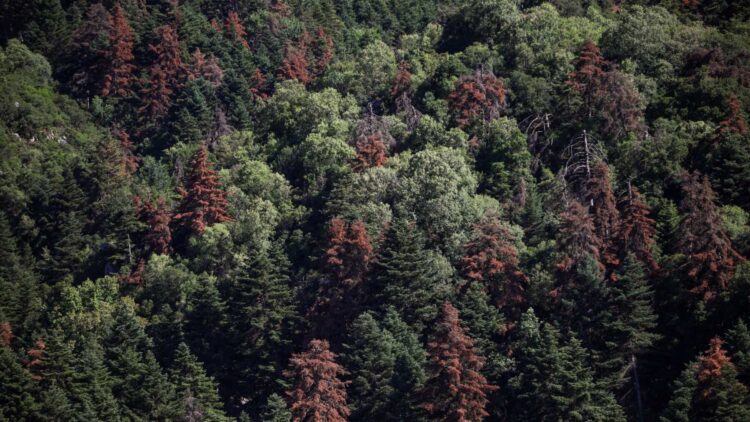The effects of climate change are increasingly visible in Europe, and this has had an impact on forests ecosystems in Greece, which are becoming more intense. Global warming is increasing, as well as decreasing rainfall and snowfall. A village called Kalavryta has become a symbol of climate change. Learn more about this news story and its impacts.
The green is disappearing in the Greek mountains
On the wooded slopes surrounding the village of Kalavryta in southwestern Greece, hundreds of dying fir trees stand out among the dark green foliage, their brittle, reddish needles a stark reminder of how drought slowly drains the life from nature. Fir trees are known to need cooler, moist climates. But prolonged droughts in recent years linked to a fast-changing climate in Greece are leaving them exposed to pest infestations, scientists and locals said.
“In the past, we used to see a few dead trees scattered amongst the healthy ones. Now, unfortunately, among the dead ones, we try to spot the few remaining healthy green firs.” said Katerina Kolirou, head of the local forest service in Kalavryta, a village famed for its forests of the Greek fir species Abies cephalonica.
Less water and moisture mean that fir trees become more vulnerable to attacks by pests that bore into their bark to lay eggs and create tunnels, disrupting the trees’ ability to transport nutrients between roots and branches and leading to their death.”These are wood-boring beetles,” said Dimitrios Avtzis, a forest entomologist and research director at the Greek Agricultural Organization Demeter, a state research agency, as he cut into the bark of a decaying tree in Kalavryta and found a beetle that he later placed in a vial for examination.
Environmental collapse process accelerates
Something that was once an isolated phenomenon has now raised concerns by demonstrating a trend. Scientists point out that beetle infestations are not just a consequence of drought, but an indicator of ecological collapse, as beetles have evolved their ability to resist attacks.
Across the globe, 2024 was the warmest year on record, with the average temperature exceeding 1.5 degrees Celsius above the pre-industrial era for the first time. Temperatures in Greece rose by the same amount between 1991-2020, but in some northwestern mountain areas there was a larger 2C increase, said director of research at the National Observatory of Athens Kostas Lagouvardos, who led a study on rising temperatures and snow cover.
Fir forest decline, also seen on the Greek mainland and the Ionian Islands, is not unique to Greece. In the province of Huesca in Spain, also in the Mediterranean region, a different species of fir in the Pyrenees mountains, the Abies Alba, has also shown signs of declining in recent years, a development that scientists link to extreme heat. In Kalavryta, authorities plan to remove dead and infested trees to limit the damage. But this might not be enough to save the forests.
Beyond the landscape, the loss of vegetation can directly impact the water cycle, local thermal balance, and even the economies of local communities, which depend on eco-tourism for their livelihood. Experts warn that without a mitigation strategy, spruce forests could become just a memory in southern Europe.
The future of forests depends on immediate action
The country now needs to find ways to combine local environmental interventions with broader climate policies to preserve what remains of the Greek fir forest, with structural actions that reduce the impact of global warming. What’s happening in Kalavryta is a wake-up call for the entire Mediterranean region, given the climate crisis, with clear signs of depletion.

